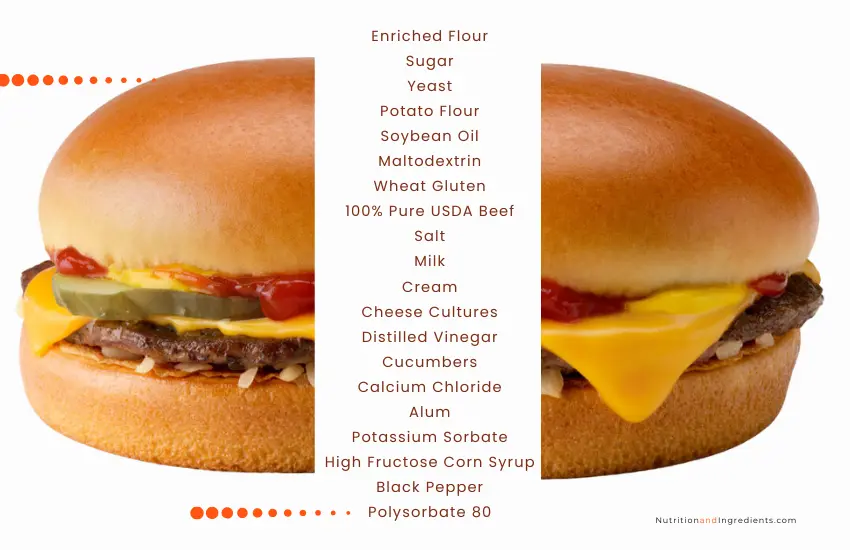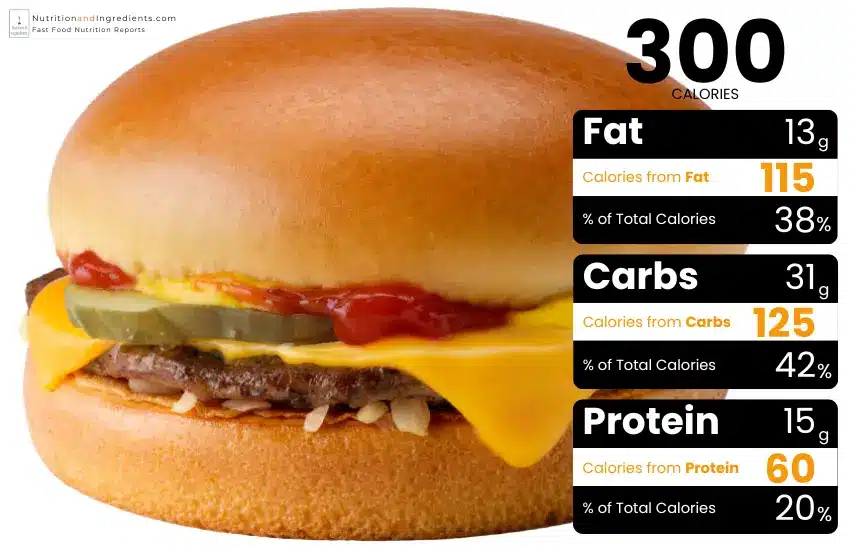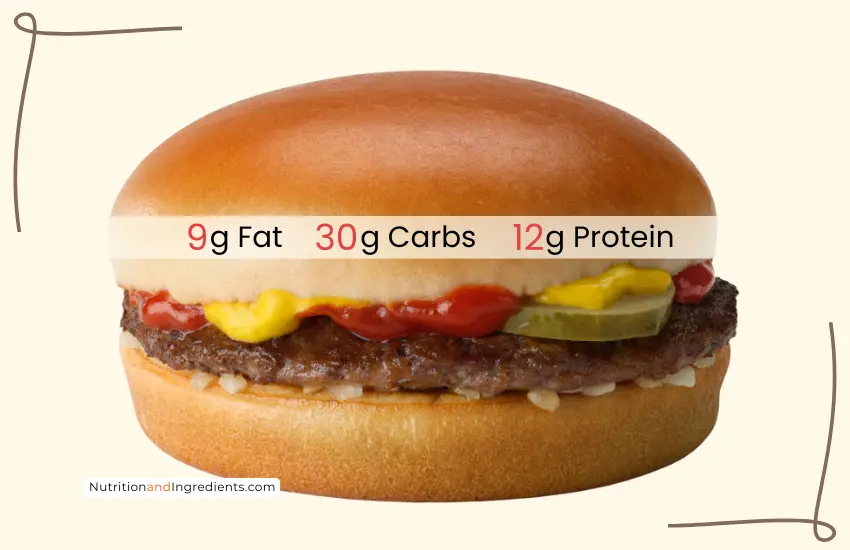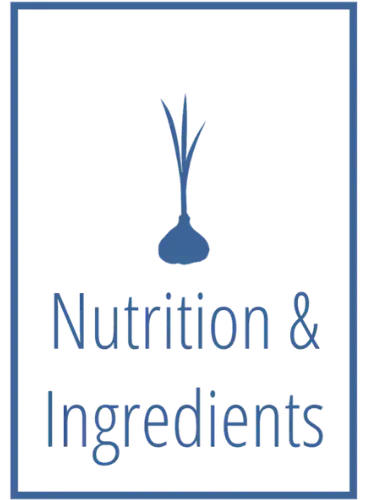McDonald’s Cheeseburger

McDonald’s Cheeseburger is a simple, yet highly popular menu item. It’s made with a single patty from 100% beef and a slice of American cheese.
There are 300 calories, 13 grams fat, 31 grams carbohydrates, and 15 grams protein in one cheeseburger (excluding any condiments).
Read this fast food guide for a detailed analysis of calories and an in-depth overview of nutrition facts, ingredients, and allergens in McDonald’s classic cheeseburger.
Cheeseburger Nutritional Information
Nutrition facts are based on standard formulations, excluding any substitutions or extra add-ons.
Calories
There are 300 calories in a single cheeseburger from McDonald’s.
Here is a summary of calories by macronutrient, per serving:
Carbohydrates contribute the highest percentage (42%) of the total calories. Fat makes up another 38% and the remaining 20% is from protein.
McDonald’s Cheeseburger
% calories from fat, carbs and proteinCalories by nutrient are rounded estimates based on the nutrition facts information provided by McDonald’s. Calories may vary by location, as a result of how the burger is prepared, or due to topping choices.

Time to Burn Calories
An average adult would need to run at a moderate pace for approximately 25 minutes to burn off the calories from a cheeseburger.
Here is a list of approximate times required to burn 300 calories, by type of exercise.
FITNESS TIME TO BURN 300 CALORIES
Estimate based on moderate level of activity by an adult with average BMI.
Nutrition Facts
Review the table below for nutrition facts in a McDonald’s cheeseburger.
Amount (%DV) per Burger
Red indicates a high %DV.
|
Calories |
300 |
%DV |
|
Total Fat |
13g |
17% |
|
Saturated Fat |
6g |
30% |
|
Trans Fat |
0.5g | |
|
Cholesterol |
40mg |
13% |
|
Sodium |
720mg |
31% |
|
Carbohydrates |
31g |
11% |
|
Dietary Fiber |
2g |
7% |
|
Total Sugars |
6g | |
|
Added Sugars |
5g |
10% |
|
Protein |
15g |
%DV based on a 2,000 calorie diet. Calorie needs vary and your %DV may be higher or lower. Provided for informational purposes only. Consult with your physician for dietary or healthcare advice.
Daily Value
Daily Value (%DV) measures the amount of a nutrient per serving, relative to the recommended limit. Use %DV to compare and select foods for a balanced diet.
As shown in the chart below, McD’s Cheeseburger is high in saturated fat and sodium.
|
%DV |
Level | |
|
Saturated Fat |
30% |
HIGH |
|
Sodium |
31% |
HIGH |
%DV based on 2,000 calorie diet. FDA suggests a %DV of 5% or less is low and 20% or more is high.
Sodium
One cheeseburger contains 720 milligrams of sodium. That is high.
The amount of sodium is 31% of the recommended daily limit of 2,300 milligrams.
Dietary Cholesterol
There are 40 milligrams of dietary cholesterol in a single McDonald’s cheeseburger. That’s a medium level with a 14% daily value.
Review Nutrition Reports
Check the amount of saturated fat and sodium to make an informed decision on which foods are the best option for your diet.
Check nutrition facts in McDonald’s burger menu.
What’s on a McDonald’s Cheeseburger?
The classic cheeseburger at McDonald’s is made with a 100% pure beef patty seasoned with salt and pepper. The sandwich includes a tangy pickle, chopped onions, ketchup, mustard and a slice of American cheese.

Cheeseburger Ingredients and Allergens
Here are the lists of ingredients in McDonald’s Cheeseburger, broken out for the beef patty, hamburger bun, cheese, ketchup, mustard, and pickles.
Ingredients
|
Beef Patty |
|
100% Pure USDA inspected beef prepared with Salt and Black Pepper. |
|
Bun |
|
Enriched Flour, Water, Sugar, Yeast, Soybean Oil, Salt, Dextrose, Corn Starch, Modified, Food Starch, Wheat Gluten, Vinegar, Vegetable Proteins (pea, potato, rice, and/or faba), Sunflower and/or Canola Oil, Maltodextrin, Natural Flavors, and Dough Conditioners. |
|
American Cheese |
|
Milk, Cream, Water, Sodium Citrate, Salt, Cheese Cultures, Citric Acid, Enzymes, Soy Lecithin, and Color Added. |
|
Ketchup |
|
Tomato Concentrate From Red Ripe Tomatoes, Distilled Vinegar, High Fructose Corn Syrup, Corn Syrup, Water, Salt, and Natural Flavors. |
|
Mustard |
|
Distilled Vinegar, Water, Mustard Seed, Salt, Turmeric, Paprika, and Spice Extractive. |
|
Pickles |
|
Cucumbers, Water, Distilled Vinegar, Salt, Calcium Chloride, Alum, Potassium Sorbate (preservative), Natural Flavors, Polysorbate 80, and Extractives Of Turmeric (color). |
Allergens
The cheeseburger is made with ingredients that contain milk, soy, and wheat.
If you have a food allergy, check the full allergen guide for McDonald’s menu and consult with your physician before deciding which food is right for you.

Nutrition facts, prices, and ingredients are based on available information as of the date of publication. Restaurants and food manufacturers may change recipes or formulations without notice. Check package labels and ask the product manufacturer or restaurant for the most up-to-date information. Unless otherwise stated, %DV is based on a 2,000 calorie diet. All reports and reviews published on this site are for informational purposes only. NutritionandIngredients.com does not provide healthcare advice or dietary recommendations. Always consult your licensed physician for any healthcare or dietary advice.
Nutrition facts and ingredients source: McDonald’s. Burger images courtesy of McDonald’s. Original designs by Nutrition & Ingredients for purposes of research and commentary related to fast food nutrition.
